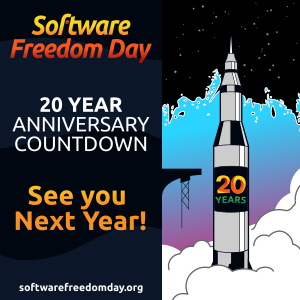Hewlett-Packard is now selling the Passport 1912nm, an all-in-one kiosk-style device for web browsing that they call an "Internet Monitor".
Running a locked-down version of Linux, the Passport offers web-browsing (through an old version of Firefox) plus the ability to view photos or listen to music loaded via the unit's USB ports. Office-type tasks could be done through web-based applications such as Google Docs. The Passport is available today and lists for $259.
Following the launch of the Google/Samsung Chromebox last month (which lists for $329 and requires a monitor), the Passport shows there is life in the thin client space after all, and provides another compelling alternative to libraries tiring of providing Internet access to patrons using costly personal computers running Windows, then having staff lock them down to handle the hand-to-hand combat of public computing.
Showing posts with label Linux. Show all posts
Showing posts with label Linux. Show all posts
Friday, June 22, 2012
Monday, May 19, 2008
A Free Thin Client in Every Box?

Slashdot reports that leading motherboard maker Asus has announced that it will extend the use of "Express Gate" technology (essentially a branded version of the Splashtop embedded Linux system) to all of its motherboards, giving about 12 million PCs per year the option of booting to a lightweight version of Linux.
I was initially thinking this would be used mainly as an exceptionally rich diagnostic environment, but a look at the promotional video reveals a much more interesting possibility. Express Gate will include Firefox, Skype, a media player and other apps, and will boot in a matter of seconds. This will allow users to bypass MS Windows when surfing the web or using web-based applications, thus avoiding unnecessarily exposing their MS Windows installation to viruses or malware on the Internet. Techgage did a good overview of Splashtop/Express Gate after CES this year.
It seems to me that for libraries, this could provide low-maintenance OPAC or lab hardware (conceivably, you could just order diskless systems or pull the drives from used systems being repurposed). Although thin clients often make sense as a public computing platform, the case is often made that adding totally unique hardware devices represents a burden for the IT support staff. Splashtop could allow libraries to choose a single vendor and variations on a single model line for both office workers and public PCs.
I was initially thinking this would be used mainly as an exceptionally rich diagnostic environment, but a look at the promotional video reveals a much more interesting possibility. Express Gate will include Firefox, Skype, a media player and other apps, and will boot in a matter of seconds. This will allow users to bypass MS Windows when surfing the web or using web-based applications, thus avoiding unnecessarily exposing their MS Windows installation to viruses or malware on the Internet. Techgage did a good overview of Splashtop/Express Gate after CES this year.
It seems to me that for libraries, this could provide low-maintenance OPAC or lab hardware (conceivably, you could just order diskless systems or pull the drives from used systems being repurposed). Although thin clients often make sense as a public computing platform, the case is often made that adding totally unique hardware devices represents a burden for the IT support staff. Splashtop could allow libraries to choose a single vendor and variations on a single model line for both office workers and public PCs.
Tuesday, November 20, 2007
Amazon's Kindle Ebook Reader - the Next iPod or the Next Newton?

By now most everyone will have heard about Amazon's Linux-based Kindle ebook reader, either from the fawning Newsweek story (the future of reading!) or the thousands of other blog posts over the last 24 hours.
In case you haven't heard of it yet, the Kindle is a 10 ounce ebook reader with an electronic ink screen, rudimentary thumbboard, enough memory to store 200 books, and wireless connectivity to Amazon's new Kindle store (using Sprint's EV-DO cellular network). Books can be purchased and downloaded from anywhere within reach of Sprint's network in just a few minutes, according to Amazon. Amazon is starting with about 90,000 books in the Kindle store, many priced at $9.99 each. For an additional charge, certain newspapers and blogs can be subscribed to through the device and will be automatically delivered to it. All this for $399, with network access included in the initial price.
Interestingly, there's an experimental live reference service called "Ask Kindle NowNow". Hmmm, you can use this device to get books to read, and answers to reference questions... What existing institutions does this compete with?
Here's my take. As a consumer product, Amazon is trying to imitate Apple's iPod and iTunes experience, making it all "just work" by creating a closed system with Amazon very much in control. The Kindle supports documents in Amazon's proprietary Kindle (.azw) and non-DRM'd Mobi (.mobi & .prc) formats, as well as text (.txt) files. It does not support the industry standard .epub format. Documents in some other formats (including HTML and Microsoft's .doc) can be run through a conversion service (apparently for a 10 cent fee) and be added to the Kindle. PDF support through this process is described as "experimental".
I liked the iPod when it first came out. It lacked features of other digital music players (no radio, for example), but the product had a sort of tactile likability that appealed to me. The closed system, DRM'd content and the prospect of having your music library hostage to the whims of a large corporation, well, these things did not appeal to me. But I could definitely see why people liked it-- like taking a packaged tour, letting someone else make decisions often makes things easier.
But the Kindle does not appeal to me on an aesthetic level. It's bland retro 80s styling and awkward looking keys don't make up for the e-ink display. And on a practical level, putting money into building up a book collection in proprietary formats worries me more than ever. The iPod got away with it in part because it was introduced six years ago. I think the tide is turning away from proprietary formats and closed systems-- just look at Apple's unsuccessful attempt to keep the iPhone closed. The price also seems too high-- although it includes the wireless service, how many people really buy enough books to justify a $400 reader? Say you save $10 per title buying the electronic version, that's 40 books just to break even on the reader. That price will limit the appeal to anyone outside the book hyper-buying classes.
So is this the "iPod for Books" we have all been looking for? Not version 1.0, anyway. In fact, the Kindle reminds me of another Apple product that came to define a product that could not break out of a niche market due to high price and compatibility issues, the Newton.
Powered by ScribeFire.
Labels:
Amazon,
AskKindleNowNow,
ebooks,
Kindle,
Linux
Subscribe to:
Posts (Atom)



